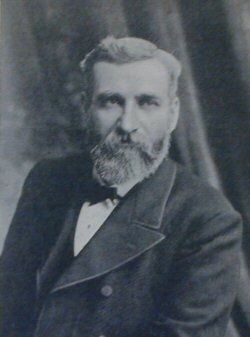 A.
HUMBOLDT SEXTON
A.
HUMBOLDT SEXTONA SON of the late Rev. Dr. G. Sexton, of London, and later of Hamilton, Ontario, born in London, and educated atprivate schools, Professor Sexton studied scientific subjects at the Birkbeck Institution and the Royal School of Mines. There the teaching of the late Dr. Percy turned his attention to metallurgical subjects, and that of the late Professor A. Ramsay led him to take great interest in geology. In 1870 he gained a Royal Exhibition, tenable at the Royal College of Science for Ireland, Dublin. There he spent two years, taking prizes in most of his classes. He was then offered by the late Sir Robert Kane, Dean of the College and Chairman of the Mining Company of Ireland, the post of Assayer and Assistant to the Manager at the Ballycorus Lead and Silver Works of that company. Whilst holding this appointment he commenced teaching evening science classes at the Young Men's Christian Association (Church of Ireland) and at the Dublin Mechanics' Institution. These were probably the first evening science classes in Dublin.
In 1873 he was appointed Assistant Chemist to the Broughton Copper Company, Manchester, and there had not only general laboratory experience, but experience also in sampling, in the details of works management, and in the smelting and refining of copper. In 1880 an opening came as Science Master at the Burslem and Tunstall School of Science and art (Wedgwood Memorial Institute, Burslem). He accepted it and removed to Burslem. Here he taught many science subjects, but gave most attention to chemistry, and added metallurgy to the subjects taught. He also paid a good deal of attention to the great localindustry, pottery.
In 1882 the Manchester Technical School was formed by a reorganisation of the old Manchester Mechanics' Institution. He applied for the post of Lecturer on Chemistry, and after being interviewed by the selecting committee, of which Sir Henry Roscoe was chairman, received the appointment. At the outset the staff of the school was small, and he had to teach chemistry, physics, metallurgy, and mineralogy, both to evening and day students.
In 1880 Glasgow Mechanics' Institute was reorganised as a College of Science under the name of the College of Science and Arts. In 1884 Mr. R. R. Tatlock resigned the Chair of Chemistry at that institution. A deputation of the Directors of the College visited Manchester to interview Mr. Sexton, and as a result he was appointed to the Chair of Chemistry. He at once reorganised the work, and in 1885 it was found necessary to largely increase the laboratory accommodation. He also added metallurgy and mineralogy to the subjects taught.
In 1886, under an order of the Queen in Council, the College of Science and Arts was amalgamated with Anderson's College and other trusts to become the Glasgow and West of Scotland Technical College. This necessitated some rearrangements of the staff, as there were two professors of chemistry. Dr. Dittmar retained the Chair of Chemistry and Mr. Sexton took the newly formed Chair of Metallurgy, which he has held since. As a matter of convenience Professor Sexton for some years retained charge of the evening classes in chemistry, but on the death of Dr. Dittmar in 1892 the evening chemistry classes were handed over to his successor, Dr. Henderson. The Metallurgical Department was then removed from Bath Street to George Street, and is now housed in the new College buildings, which were opened in 1905. A large number of students have passed through thelaboratories, many of whom are now in charge of metallurgical works in all parts of the world.
Professor Sexton is a Fellow of the Chemical Society and of the Institute of Chemistry, a past President of the West of Scotland Iron and Steel Institute, and a member of many local and other societies. He has contributed a considerable number of papers on technical subjects to the societies, and is a regular contributor to such technical periodicals, English and American, as Mechanical Engineering, The Practical Engineer, Fielden's Magazine, The Engineering Magazine (New York), Cassier's Magazine, The Engineering Review, and The Engineering and Mining Journal (New York), besides general and educational magazines of various kinds, and the photographic journals. He has published the following books:- "Elementary Inorganic Chemistry" (Blackie & Co.), 7th edition; "Home Work in Chemistry" (Chapman & Hall), 2nd edition; ''Fuel and Refractory Materials" (Blackie & Co.); "Qualitative Chemical Analysis" (Griffin & Co.), 4th edition; "Quantitative Chemical Analysis" (Griffin & Co.) 4th edition; "An Elementary Manual of Metallurgy" (Griffin), 3rd edition; "The Metallurgy of Iron and Steel" (Scientific Publishing Co.); "A Manual of Metallurgical Analysis and Assaying" (in conjunction with Mr. Rhead, of Manchester) (Longmans); "The Chemistry of Materials of Construction" (Technical Publishing Co.); "Produce Gas" (Scientific Publishing Co.); "The Corrosion and Protection of Metals" (Scientific Publishing Co.); "Alloys" (Scientific Publishing Co.), a new and revised edition of Greenwood's Steel and Iron (Cassell); and "The First Technical College," a sketch of the history of the Andersonian and the Institutions descended from it (Chapman & Hall) (out of print). Some of these books have become standard text-books of the subjects on which they treat.
Professor Sexton takes an active part in social work, especially in connection with temperance, and on retiring from the Chair of Metallurgy in 1909 declared his intention of devoting still further effort in these directions.